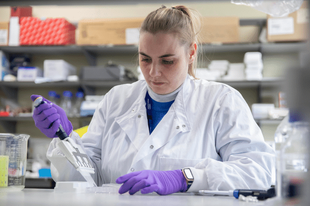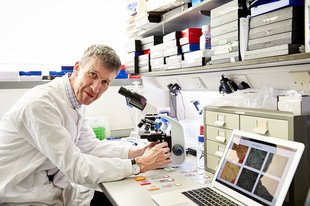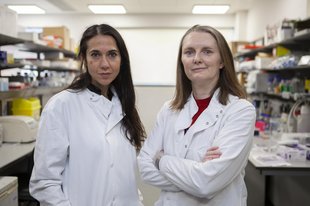A Year of Exciting Research Progress
Many exciting new research ventures kick-started at the Ovarian Cancer Action Research Centre last year – and what a busy year it was indeed.
Led by Professor Iain McNeish and Professor Christina Fotopoulou, our dedicated team have been tackling ovarian cancer with innovation and a renewed sense of urgency.
These research projects are charting a new course for hope and survival for every woman diagnosed with ovarian cancer.
This progress is happening because of your support.

Dr Anke Nijhuis at the Ovarian Cancer Action Research Centre in London.
Could a breast cancer drug be effective for ovarian cancer?
Sometimes, the best discoveries come from unexpected places.
Our scientists at the Ovarian Cancer Action Research Centre have been exploring the potential of repurposing existing drugs as a way to accelarate the findings and reach breakthroughs more quickly.
They are investigating whether Samuraciclib, a drug used to treat breast cancer, could also be effective against ovarian cancer.
Early-stage trials have shown promise in the past year, suggesting the drug is well -tolerated and may have anti-tumour activity.
This exciting development could lead to a faster path to clinical trials for ovarian cancer patients – as the drug has already been approved – offering a potential new weapon in the fight against this disease.
The next stage of research involves pre- clinical studies. The team will use biopsies from ovarian cancer patients to test whether Samuraciclib could be an effective treatment – by itself and in combination with existing treatments like carboplatin and PARP inhibitors.
These are early days, but the research holds the promise to move onto clinical trials and be considered as an additional treatment for ovarian cancer.
Silencing cancer's conversation
Professor Iain McNeish and his team have discovered that some cells create an environment that allows the tumour to flourish.
In theory, if we disrupt the communication between cancer cells and these allies, we might reduce the chances of cancer making an unwelcome return.
These findings have now been published in a well-received paper and shared with scientists worldwide.

Professor Iain McNeish at the Ovarian Cancer Action Research Centre in London.
The path to stopping recurrence
One of the reasons why ovarian cancer is so deadly, is because of the high rates of recurrence. We need to focus on reducing recurrence to impact survival rates as a whole.
Our researchers are tackling the issue of methylation, which is what happens when a cancer cell is able to evade treatment and continue to grow.
This year, the team has created specialised molecules to control methylation. These molecules could make cancer cells more susceptible to existing therapies and even prevent them from coming back altogether!
Tailored treatments are closer than ever before
Each woman's experience of ovarian cancer is unique – so their treatment should be personalised too.
Over the past year, Professor Christina Fotopoulou and Dr. Paula Cunnea have meticulously gathered a comprehensive set of tumour samples, revealing significant variations between individual cases.
This work paves the way for a more targeted approach, moving beyond a ‘one-size-fits- all’ strategy.
By diligently collecting and analysing tumour samples, scientists are laying the groundwork for treatments tailored to each patient's specific needs – because personalised care should not be a luxury but a necessity.

Our dedicated scientists tirelessly work towards groundbreaking advancements in treating and caring for ovarian cancer patients. But they can’t do it alone.
You can help fund vital research and accelerate progress in the fight against this devastating disease.
Together, we can see a future where every woman can conquer ovarian

